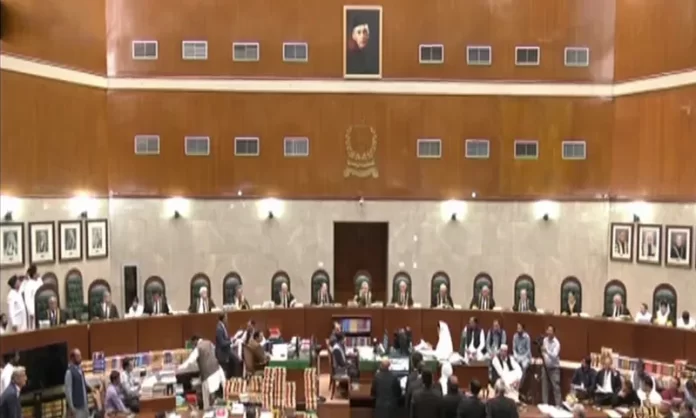The Supreme Court (SC) of Pakistan has recently heard a series of petitions challenging the Supreme Court (Practice and Procedure) Act 2023. This law requires the formation of benches on constitutional matters of public importance by a committee of three senior judges of the court. The hearing, which is being broadcast live on television, is being presided over by all 15 judges of the top court.
The petitions were brought forward after Chief Justice of Pakistan (CJP) Qazi Faez Isa formed a full court to address the challenge to the legislation. The bench, headed by CJP Isa, consists of 14 other judges. The federal government has urged the court to dismiss the pleas, arguing that challenges to an act of Parliament are inadmissible.
During the hearing, the lawyers representing the petitioners argued their case, with Justice Ayesha questioning the implications of upholding the law on Section 5. The lawyers argued that this intrusion by Parliament into the affairs of the Supreme Court prompted them to file the petition, as they believe institutions should remain within their own domains.
The judges pressed the lawyers to focus on their arguments and read out the Act, reminding them to stick to constitutional arguments. They also questioned whether the law curtailed the powers of the CJP or the Supreme Court as a whole.
The Attorney General for Pakistan argued for the maintainability of the pleas, contending that they failed to meet the criteria under Article 184(3) of the Constitution, which requires a matter of public importance related to the enforcement of fundamental rights for a case to be admissible.
The Supreme Court (Practice and Procedure) Act 2023 was enacted by the previous government of Pakistan and aimed to limit the powers of the Chief Justice of Pakistan by establishing a three-member bench to decide on the initiation of suo motu cases. Previously, this power was solely vested in the Chief Justice. The law also extends the review jurisdiction of the Supreme Court, allowing appeals to be filed within 30 days of judgments in suo motu cases.
During the hearing, Justice Faez Isa was sworn in as the new Chief Justice of Pakistan. He refused to receive a guard of honor, instead focusing on the cooperation and support of the court staff in addressing the issues facing the people of Pakistan.
The Supreme Court will resume the hearing after receiving the written arguments from the parties by September 25. The decision of the court on this matter will have important implications for the powers of the Chief Justice and the functioning of the Supreme Court in Pakistan.
